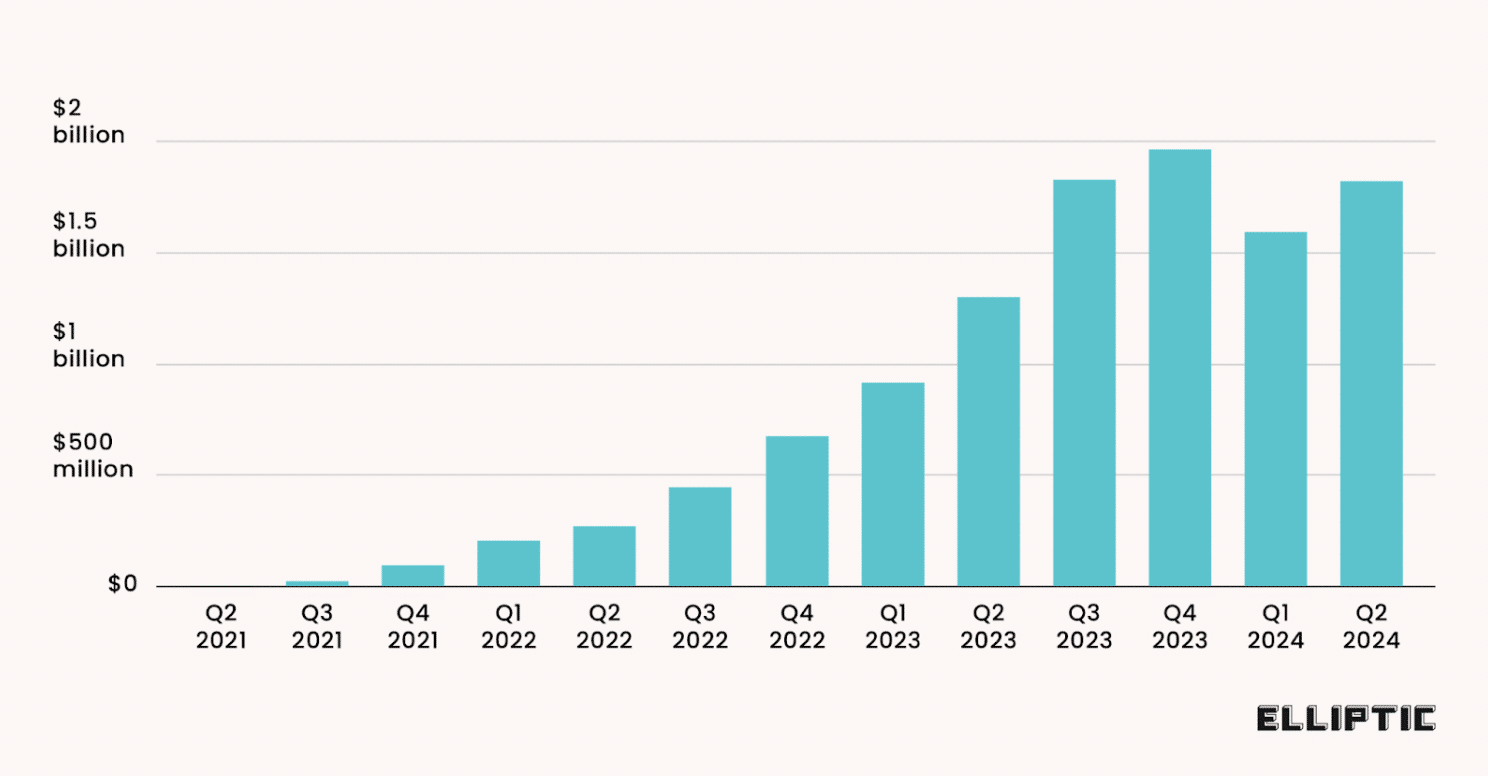Crypto scam
Tether is used by criminals way more than you think
Published
5 months agoon
By
admin
Reports have repeatedly suggested that Tether worth billions of dollars has been laundered following pig butchering and sextortion scams — and it’s a problem getting worse, not better.
An in-depth new report has exposed how the USDT stablecoin is being widely used as a payment method in a criminal marketplace, with illicit wallets receiving more than $11 billion over the past three years.

The blockchain analytics firm Elliptic says Tether is the primary payment method of a platform called Huione Guarantee, which facilitates transactions on behalf of cybercriminals and their customers.
Some merchants claim they can assist with money laundering, especially with ill-gotten gains obtained through pig butchering incidents. Others say they’re willing to help deal with the proceeds of sextortion scams.
For the uninitiated, pig butchering scams see fraudsters gradually win the trust of unsuspecting individuals — often by pretending to be romantically interested — and encouraging them to gradually place their entire life savings into too-good-to-be-true crypto investments.
Through Huione Guarantee, it’s even possible to hire people to create websites for these fake investment opportunities — and acquire “AI face changing” software so scammers can convincingly communicate with their prey.

Countless billions of dollars have been lost to pig butchering scams, but it’s easy to lose sight of the fact that, more often than not, the people tasked with carrying out these crimes are victims too. They often travel to South East Asian nations such as Cambodia and Myanmar in the hope of high-paying work, only to be imprisoned with their passports confiscated.
Chillingly, items are also sold on Huione Guarantee to torture these workers, including shackles that deliver electric shocks — and batons to beat them with.
“Some of these forced workers resort to suicide or die in suspicious circumstances,” the Elliptic investigation warned.

Authors pointed to “overwhelming evidence” that Huione Guarantee’s “predominant role is to act as an illicit marketplace.” And in another surreal development, it appears that this platform has ties to a large Cambodian firm that dabbles in everything from airlines to real estate, with one executive who is closely related to the country’s prime minister.
While the report shows the sheer scale of pig butchering scams in a new light, Elliptic said that one benefit of crypto payments is “the transparency of the blockchain,” as flows of USDT can be monitored and frozen to starve scammers of revenue.
“Following our investigations, hundreds of cryptocurrency addresses controlled by Huione companies and used by merchants operating on Huione Guarantee have been labeled in Elliptic’s tools,” it added.
Clampdowns continue
There has also been growing evidence of Tether being used to orchestrate criminal activity in China, where the use of cryptocurrencies is banned.
Back in May, a large underground gang that allowed individuals to sidestep strict foreign currency rules and send funds abroad was busted by police, with local media reports suggesting $1.9 billion was transferred overseas.
The United Nations also shed light on the issue in January, when it alleged that USDT on Justin Sun’s TRON blockchain had “become a preferred choice for regional cyberfraud operations and money launderers alike due to its stability and the ease, anonymity and low fees of its transactions.”
Over the space of a 12-month period, estimates suggested that more than $17 billion in Tether was “connected to underground currency exchanges, illegal commodity trades, unlawful collection and payment processes, and various criminal activities.”
There has also been growing evidence of USDT being demanded as a ransom by kidnappers. Two unemployed women brazenly abducted a three-year-old boy from a shopping center in Hong Kong, and later left a note ordering his mother to pay $640,000 worth of Tether to a wallet. The culprits were later arrested and the child was thankfully unharmed.
A recent TRM Labs report went on to say that Tether was far and away the stablecoin with the most illicit volume — with estimates suggesting that 1.63% of trades were linked to criminal activity. By comparison, this figure fell to just 0.05% of transactions involving USDC.
This has also had ramifications when it comes to the financing of terrorism — and while crypto exchanges and payment processors have embarked on a clampdown in recent years, TRON remains popular.
“Among those terror financing campaigns that continued to accept cryptocurrency, the number of unique TRON addresses that received Tether (USDT) rose by 125%,” the report noted.
Addressing these allegations, a Tether spokesperson told Bloomberg:
“Historical evidence repeatedly shows that transactional figures have often been exaggerated due to a misinterpretation of data that assumes that if a service receives some small portion of illicit funds then all funds in the service are illicit, significantly inflating the actual values.”
Tether
Source link
You may like


Tron’s Justin Sun Offloads 50% ETH Holdings, Ethereum Price Crash Imminent?


Investors bet on this $0.0013 token destined to leave Cardano and Shiba Inu behind


End of Altcoin Season? Glassnode Co-Founders Warn Alts in Danger of Lagging Behind After Last Week’s Correction


Can Pi Network Price Triple Before 2024 Ends?


XRP’s $5, $10 goals are trending, but this altcoin with 7,400% potential takes the spotlight


CryptoQuant Hails Binance Reserve Amid High Leverage Trading
Blockchain
Crypto fakes on X nearly doubled, reaching over 300 accounts daily
Published
2 weeks agoon
December 10, 2024By
admin

Bad actors keep ramping up crypto scams, with impersonation accounts surging to over 300 a day, according to blockchain analysts.
Crypto scams on X are once again rising fast, with major accounts hijacked to promote fake tokens. Victims have already lost millions, and experts are warning users to stay alert.
Analysts at blockchain firm Scam Sniffer warned in an X post on Dec. 10 that starting this week, daily impersonation accounts surged by 87%, jumping to over 300 compared to the November average of 160. The spike increases the risk for users as scammers continue to exploit high-profile accounts to push fraudulent schemes.
🚨 SCAM ALERT: Surge in X Impersonations 📈
Our monitoring system detected a significant increase in crypto fake accounts this week, with daily numbers reaching 300+ (vs. Nov avg. 160) 📊
⚠️ Two victims lost over $3M recently from clicking malicious links/signing transactions… pic.twitter.com/eGhG1GPX0r
— Scam Sniffer | Web3 Anti-Scam (@realScamSniffer) December 10, 2024
The analysts note that in one recent case alone, two victims lost over $3 million worth of crypto by interacting with malicious links and signing transactions linked to fake accounts. As crypto.news reported earlier, the scams are particularly prevalent on Solana (SOL), where compromised accounts, including those of major entities like Yahoo News UK, Lenovo India, and Money Control, have been used to push a scam meme coin called HACKED.
Blockchain sleuth ZachXBT, who has been tracking these scams, recently issued a warning to the crypto community, advising users to be extra cautious. “So far, it seems the scammers may have lost money, as the market cap of the HACKED token is a modest $67K, and top traders have barely made $1K,” ZachXBT noted.
The compromised X accounts appear to have been connected to the same malicious site or application. As a precaution, ZachXBT recommends that users revoke any access permissions to unfamiliar sites or apps.
The latest incident follows a series of similar scams, including the recent use of Kylian Mbappé’s account to promote a fake MBAPPE meme coin. Earlier in September, hackers also targeted family members of U.S. president-elect Donald Trump in a scam involving the fake World Liberty Financial coin.
Source link
Crypto scam
Why HAWK Memecoin Crashed from $500M to $60M in Minutes
Published
3 weeks agoon
December 5, 2024By
admin

Hailey Welch, an influencer on social media, launched her own memecoin, Hawk Tuah, on Dec. 4. The cryptocurrency crashed from $500 million to $60 million in just 20 minutes post-launch.
Hailey Welch, commonly known as the Hawk Tuah Girl on the internet, launched her new memecoin of the same name, $HAWK, on Solana on Dec. 4. The coin quickly took off, garnering a market cap of about $500 million, which then crashed to nearly $60 million, all within 20 minutes of launch. The news was further confirmed by Solana (SOL) on X.
Who is Hawk tuah girl?
Welch first rose to fame as the “Hawk tuah girl” after a video of her went viral, making a comical onomatopoeic sound of spitting took over social media earlier this year. With the meme, Welch soon progressed from working a minimum wage job to finding herself in an internet meme culture. Building on this viral moment, Welch launched the HAWK token.
Rise and fall of HAWK token
The massive drop of almost 88% in the HAWK token has reignited the discussion on the high volatility of memecoins in the cryptocurrency community. Some crypto users believe the token was initially built for rug pulling, a cryptocurrency scam in which developers withdraw liquidity or suddenly abandon a project, resulting in the token’s price plummeting.
According to content generated by the community on X, the Hawk token’s supply was allegedly “sniped” shortly after launch. This refers to instances where early investors or bots snatch up large amounts of tokens, leaving the broader community with less access and exposing them to risks. These are often warning signs of the health of the project as it shows few people own the token. However, not all holders have sold their HAWKs, as posted by a user, ZeusLFG, reflecting a strong optimism for the token.
At the time of writing, the token’s trading volume has risen exponentially by 951.67%, as per CoinMarketCap. While the debate goes on, Hawk Token remains under close observation, with members of the community demanding additional disclosures to confirm these claims and keep a close eye on this project.
Source link
24/7 Cryptocurrency News
Pro Gamer Linked to $3.5M Meme Coin Scam: ZachXBT
Published
4 weeks agoon
November 28, 2024By
admin
The crypto market has become the center of attention, with the Bitcoin price aiming at the $100k mark. However, another incident is also gaining investors’ attention these days. A famous crypto investigator, ZachXBT made a major crypto scam finding, linking a pro gamer to a $3.5M meme coin scam. More importantly, these scams were also linked to major celebrity social media account hacks, scam promotions, and much more.
At one point, the crypto industry had earned a name for itself among the biggest finance entities, with $3.31T in global market capitalization. However, the rising crypto scams, theft, and laundering are concerning. Even Changpeng Zhao showed disappointment in memecoin and the rising scams.
ZachXBT Unveils $3.5M MemeCoin Scam and the Culprit
In 2024, the crypto market faced many wallet hacks, rug pull scams, and many other concerning scams. However, celebrity account hacks and the promotion of cryptocurrency-related scams were the most frequent.
Considering the rising case, a popular crypto investigator, ZachXBT, analyzed nine celebrity account hacks and the involved meme coins. He concluded that there is a connection between all these hacks. More importantly, he claimed that a pro-Fortnite gamer known by the name Serpent is the mastermind behind this.
ZachXBT linked this pro gamer in the $3.5M meme coin scam, confirming that he used multiple Pump.Fun memecoin and pump and dump tactics to make millions. Surprisingly, the biggest connection was the Serpent’s ERROR project wallet, which interacted with every social media hacker’s wallets directly or indirectly.
1/ An investigation into how the threat actor Serpent went from a pro Fortnite player to helping steal $3.5M via meme coin scams launched from 9+ account compromises on X & IG and gambling the proceeds away at online casinos. https://t.co/zR6QtuQW8a pic.twitter.com/Y8ovnEnQgj
— ZachXBT (@zachxbt) November 27, 2024
Serpent is known as a pro gamer and blockchain security analyst. He is even the founder of the Sentinel, which is a threat mitigation system but new reports link him with the scam, making it a big controversy. More importantly, he scammed $3.5M and gambled them away in online casinos. The controversy grew as Serpent deleted many of his X posts right after ZachXBT’s claims.
Breaking Down The Serpent’s Crypto Scam
In a detailed X post, ZachXBT revealed his finding to the crypto community, which explained the memecoin scams of more than $3.5M after the scammer compromised various celebrity social media accounts. It includes the account hacks of McDonald’s, Usher, Kabosu Owner, Andy Ayrey, Wiz Khalifa, SPX 6900, etc X (Twitter) and Instagram.


McDonald’s Instagram hack was among the first hacks of the year, where the scammer promoted a memecoin called GRIMACE and earned more than $690k with the pump and dump tactics. This happened on August 21, and the person shifted the funds to two main crypto wallets. The crypto scammer transferred 101.5 SOL to two addresses on September 3 and deployed the SCHRADER token. Interestingly, this token was promoted during the Actor Dean Norris X account hack.
Further, on September 6, the scammer processed Mcdonald’s ATO to a casino deposit address with the beginning address as B2fw. This same account transferred 110 Sol to two new wallet addresses on September 12 and sniped the meme coins which was used during the Usher crypto hack. The same B2fw wallet transferred 4868 SOL to casino deposit address ECb5v, which is connected to Andy Ayrey and the Enoshima Aquarium hack on October 15. Within the same day, 84 SOLs were transferred to ECb5v.
Even the popular AI bot Truth Terminal owner’s X account got hacked on October 29, which stayed compromised for days. In that period, 6 memecoins were promoted on his account. All these involved a common 3GVUs wallet, and the same wallet transferred 169 SOL to Ecb5vs on October 30. However, this is just the mid, the list goes on for others.
Bottom Line
Meme-themed cryptocurrencies gained investors attention in 2024, where many offered heavy gains, mainly the Solana memecoins. As a result, millions of Solana-based meme tokens were launched this year on Pump. Fun, but many were misused for crypto scams. With his recent investigation, ZachXBT has revealed the person behind the $3.5M meme coins scam. The scams also involved hacking celebrity accounts and promoting tokens to boost their price and dumping them all. This way, the scammer or alleged pro-Fortnite gamer Serpent made heavy returns, but others were left with losses.
Pooja Khardia
With a deep-seated passion for reading and five years of experience in content writing, Pooja is now focused on crafting trending content about cryptocurrency market.
As a dedicated crypto journalist, Pooja is constantly seeking out trending topics and informative statistics to create compelling pieces for crypto enthusiasts. Staying abreast of the latest trends and advancements in the field is an integral part of her daily routine, fueling a commitment to delivering timely and insightful coverage
Disclaimer: The presented content may include the personal opinion of the author and is subject to market condition. Do your market research before investing in cryptocurrencies. The author or the publication does not hold any responsibility for your personal financial loss.
Source link

Tron’s Justin Sun Offloads 50% ETH Holdings, Ethereum Price Crash Imminent?

Investors bet on this $0.0013 token destined to leave Cardano and Shiba Inu behind

End of Altcoin Season? Glassnode Co-Founders Warn Alts in Danger of Lagging Behind After Last Week’s Correction

Can Pi Network Price Triple Before 2024 Ends?

XRP’s $5, $10 goals are trending, but this altcoin with 7,400% potential takes the spotlight

CryptoQuant Hails Binance Reserve Amid High Leverage Trading

Trump Picks Bo Hines to Lead Presidential Crypto Council

The introduction of Hydra could see Cardano surpass Ethereum with 100,000 TPS

Top 4 Altcoins to Hold Before 2025 Alt Season

DeFi Protocol Usual’s Surge Catapults Hashnote’s Tokenized Treasury Over BlackRock’s BUIDL

DOGE & SHIB holders embrace Lightchain AI for its growth and unique sports-crypto vision

Will Shiba Inu Price Hold Critical Support Amid Market Volatility?

Chainlink price double bottoms as whales accumulate

Ethereum Accumulation Address Holdings Surge By 60% In Five Months – Details

Ripple Transfers 90M Coins, What’s Happening?
182267361726451435

Why Did Trump Change His Mind on Bitcoin?

Top Crypto News Headlines of The Week

New U.S. president must bring clarity to crypto regulation, analyst says

Will XRP Price Defend $0.5 Support If SEC Decides to Appeal?

Bitcoin Open-Source Development Takes The Stage In Nashville

Ethereum, Solana touch key levels as Bitcoin spikes

Bitcoin 20% Surge In 3 Weeks Teases Record-Breaking Potential

Ethereum Crash A Buying Opportunity? This Whale Thinks So

Shiba Inu Price Slips 4% as 3500% Burn Rate Surge Fails to Halt Correction

Washington financial watchdog warns of scam involving fake crypto ‘professors’

‘Hamster Kombat’ Airdrop Delayed as Pre-Market Trading for Telegram Game Expands

Citigroup Executive Steps Down To Explore Crypto
Mostbet Güvenilir Mi – Casino Bonus 2024

NoOnes Bitcoin Philosophy: Everyone Eats
Trending

 3 months ago
3 months ago182267361726451435

 Donald Trump5 months ago
Donald Trump5 months agoWhy Did Trump Change His Mind on Bitcoin?

 24/7 Cryptocurrency News4 months ago
24/7 Cryptocurrency News4 months agoTop Crypto News Headlines of The Week

 News4 months ago
News4 months agoNew U.S. president must bring clarity to crypto regulation, analyst says

 Price analysis4 months ago
Price analysis4 months agoWill XRP Price Defend $0.5 Support If SEC Decides to Appeal?

 Opinion5 months ago
Opinion5 months agoBitcoin Open-Source Development Takes The Stage In Nashville

 Bitcoin5 months ago
Bitcoin5 months agoEthereum, Solana touch key levels as Bitcoin spikes

 Bitcoin5 months ago
Bitcoin5 months agoBitcoin 20% Surge In 3 Weeks Teases Record-Breaking Potential



✓ Share: